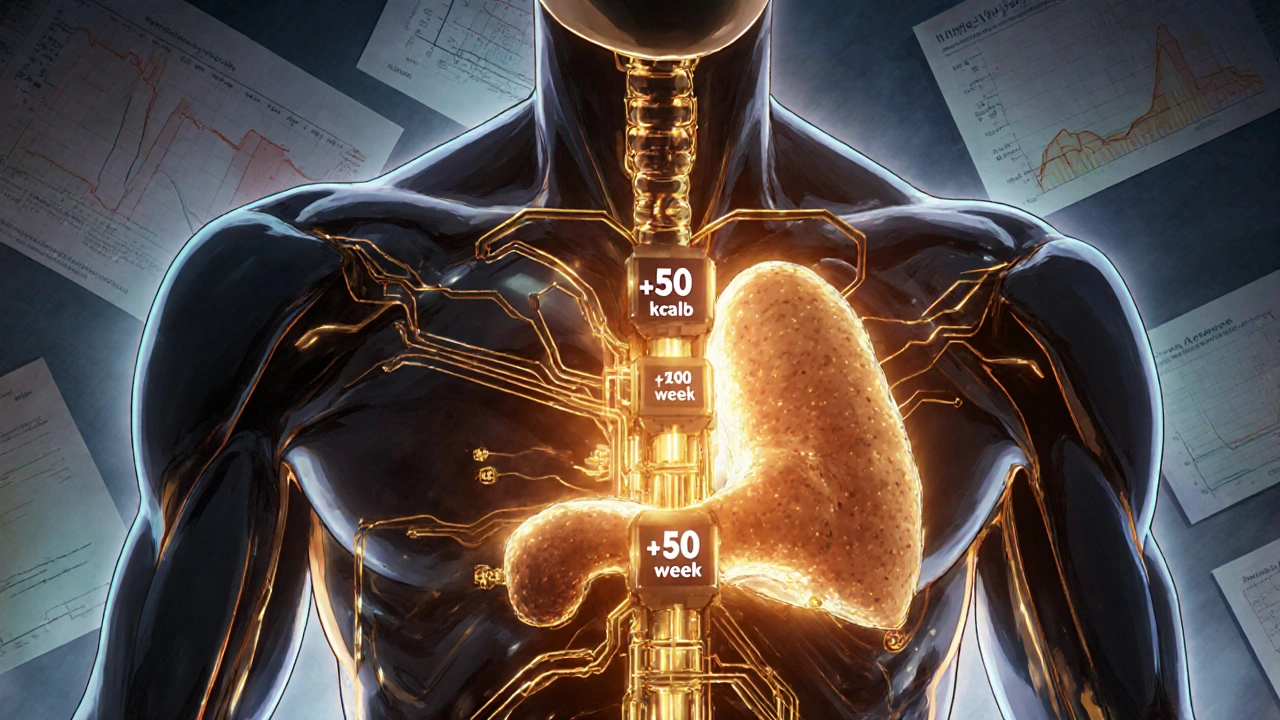 Nov, 26 2025
Nov, 26 2025
After losing 50 pounds, Sarah thought she’d finally won. She’d stuck to her diet for 10 months, tracked every calorie, and hit her goal. But then, something strange happened. Even though she was eating the same amount she had during her weight loss, the scale wouldn’t budge. Worse - she was constantly tired, hungrier than ever, and her workouts felt harder. She wasn’t doing anything wrong. Her body was just adaptive thermogenesis - a biological survival mechanism that kicks in after weight loss and makes it feel like your metabolism has broken.
What Is Adaptive Thermogenesis?
Adaptive thermogenesis isn’t a myth. It’s a real, measurable drop in your resting metabolic rate - the number of calories your body burns just staying alive - that goes beyond what you’d expect from losing weight. When you lose fat and muscle, your body should naturally burn fewer calories. But adaptive thermogenesis makes it burn even fewer. In some cases, people lose 150 to 200 extra calories per day just from this effect, even after accounting for their new, smaller body size.
This isn’t about laziness or willpower. It’s biology. Your body treats weight loss like starvation. Evolution didn’t care about beach bodies - it cared about survival. When food gets scarce, your body slows down to conserve energy. Leptin, the hormone that tells your brain you’re full, plummets. Thyroid activity drops. Your sympathetic nervous system quiets down. Brown fat, which burns calories to make heat, becomes less active. All of this adds up to a slower metabolism.
One of the most famous studies on this came from the contestants of The Biggest Loser. Six years after the show, most had regained nearly all their weight. But their metabolisms? They were still running 500 calories per day slower than expected for their new size. That’s like eating a whole extra burger every day without gaining weight - and then suddenly, your body says, “Nope, we’re not doing that anymore.”
Why Reverse Dieting Isn’t Just a Trend
Reverse dieting is the practical response to adaptive thermogenesis. Instead of staying stuck at a low calorie intake forever, you slowly increase your food intake to help your metabolism recover - without packing on fat.
The idea is simple: after a long diet, your body is in energy conservation mode. If you suddenly go back to eating like you did before you lost weight, you’ll likely gain fat. But if you creep up your calories - say, by 50 to 100 per week - your body gets time to adjust. It starts to believe food isn’t scarce anymore. Leptin rises. Thyroid function improves. Your resting metabolic rate creeps back up.
Studies show this works. A 2020 study found that people who increased calories gradually after restriction regained less fat and saw a bigger rebound in energy expenditure than those who jumped back to maintenance calories overnight. The key is patience. Most people need 3 to 6 months to fully reverse the metabolic slowdown. Rushing it - like adding 200+ calories a week - almost always leads to weight regain.
What Actually Works in Reverse Dieting
Not every reverse dieting plan is created equal. Here’s what science-backed success looks like:
- Start slow: Add 50-100 calories per week. If you’re eating 1,500 calories, go to 1,550 next week, then 1,600, and so on.
- Focus on protein: Keep protein high - 1.6 to 2.2 grams per kilogram of body weight. This protects muscle, which is the most metabolically active tissue in your body. Losing muscle during dieting makes adaptive thermogenesis worse.
- Train with weights: Resistance training 2-3 times a week helps rebuild muscle and signals your body it needs more energy. Research shows muscle preservation cuts adaptive thermogenesis by about 15%.
- Track more than the scale: Use energy levels, sleep quality, hunger, and even your morning body temperature. A drop of 0.5°C in your basal temperature can signal your metabolism is still suppressed.
- Don’t fear the scale: You might gain a pound or two. That’s okay. It’s likely water and glycogen, not fat. Give it 2-3 weeks before adjusting.
One Reddit user, u/HealthyHustle22, lost 100 pounds over a year and then spent 8 months reverse dieting. His metabolism went from 1,800 calories (what he ate during weight loss) back up to 2,600 - his true maintenance level. He didn’t gain any fat back. He just stopped feeling exhausted all the time.

What Doesn’t Work
There’s a lot of noise out there. You’ll see influencers promising “metabolic reset” supplements, 7-day reverse dieting plans, or “eat more to burn more” without any structure. These don’t work.
Supplements claiming to boost metabolism? Most are placebo. Caffeine might give you a short-term energy spike, but it won’t reverse the hormonal and neural changes behind adaptive thermogenesis.
Extreme calorie cycling - like eating 1,000 calories one day and 3,000 the next - can confuse your body further. Reverse dieting isn’t about chaos. It’s about consistency and gradual change.
And here’s the hard truth: reverse dieting won’t fix everything. If you’ve yo-yo dieted multiple times, your metabolism might not bounce back fully. That’s not your fault. It’s biology. But you can still get closer to your true maintenance level - and that’s enough to live without constant hunger or fatigue.
When to Consider Medical Help
If you’ve done everything right - slow reverse dieting, strength training, high protein, patience - and your metabolism still feels stuck, it might be time to look deeper.
Emerging research shows that gut bacteria, thyroid function, and even certain genetic markers can influence how severely adaptive thermogenesis hits you. A 2024 study found that people with specific gut microbiome profiles had much stronger metabolic slowdowns after weight loss. While testing isn’t widely available yet, companies like Zoe and Levels are developing tools to measure your individual metabolic response using continuous glucose monitors and indirect calorimetry.
If you’re struggling with extreme fatigue, cold intolerance, hair loss, or irregular periods, talk to a doctor. Low thyroid function or other hormonal imbalances can mimic or worsen adaptive thermogenesis. Blood tests for TSH, free T3, free T4, and leptin can help rule out medical causes.

Why Most People Fail at Long-Term Weight Loss
The National Institutes of Health says only 20% of people keep off 10% or more of their lost weight after one year. Why? Because most programs ignore adaptive thermogenesis. They teach you how to lose weight - but not how to live after losing it.
Weight loss isn’t the finish line. It’s the starting line for the real challenge: maintenance. And maintenance requires understanding that your body isn’t broken. It’s doing exactly what evolution designed it to do: survive.
Reverse dieting isn’t about cheating your way back to normal. It’s about working with your biology, not against it. It’s about giving your metabolism the time and signals it needs to trust that food isn’t going away again.
Companies in the weight loss industry know this. In 2023, 78% of major programs started including metabolic adaptation education. Even bariatric surgery - which bypasses the problem by physically limiting food intake - is now being studied for how it blunts adaptive thermogenesis compared to dieting alone.
The Future of Metabolic Recovery
Science is moving fast. Researchers at Columbia University are testing drugs that activate brown fat to counteract metabolic slowdown. The NIH is running a trial to see if high-protein reverse dieting (40% protein) helps preserve metabolism better than standard plans. Early results show an 18% improvement in resting energy expenditure.
But the most powerful tool you have right now isn’t a pill or a device. It’s knowledge. Knowing that your hunger isn’t weakness. That your fatigue isn’t laziness. That your stalled progress isn’t failure - it’s biology.
Reverse dieting isn’t magic. It’s medicine. Slow, steady, and science-backed.
Is adaptive thermogenesis real, or just an excuse for weight regain?
It’s real. Multiple peer-reviewed studies, including those published in Diabetes Spectrum and Obesity Journal, confirm that resting metabolic rate drops more than expected after weight loss - even when accounting for lost muscle and fat. This isn’t a myth; it’s a measurable physiological response tied to hormones like leptin and thyroid function. It’s why people who lose weight often struggle to keep it off, even when they eat the same as before.
How long does reverse dieting take?
It typically takes 3 to 6 months, depending on how long and how intensely you dieted before. If you lost 50 pounds over a year, expect to spend at least 4-5 months slowly increasing calories. Rushing it by adding too many calories too fast usually leads to fat gain. Patience is the key ingredient.
Can I reverse diet without gaining any weight?
You might gain a little - usually 1-3 pounds - but it’s often water and glycogen, not fat. The goal isn’t to stay perfectly flat during reverse dieting. It’s to let your metabolism recover so you can eat more without gaining fat long-term. If your weight stays stable or increases by less than 0.5 pounds per week, you’re on track.
Do I need to keep reverse dieting forever?
No. Once you reach your true maintenance calories - the amount you can eat without gaining or losing weight - you stop increasing. Then you just maintain. Many people find they can eat 300-600 more calories per day than they could during their diet, without regaining weight. That’s the win.
Will reverse dieting help me lose more fat?
No. Reverse dieting is for recovery, not further fat loss. If you’re still losing weight, you’re not reverse dieting - you’re still dieting. The point is to stop losing and start rebuilding your metabolism so you can eat enough to feel good, stay energized, and avoid rebound weight gain.
What if reverse dieting doesn’t work for me?
It might not fully reverse your metabolism - especially if you’ve cycled weight up and down multiple times. But even partial recovery helps. Most people report better energy, less hunger, and improved sleep. That’s progress. If you’re still stuck after 6 months of proper reverse dieting, consider seeing a doctor to check thyroid function, leptin levels, or gut health. Sometimes, the issue isn’t just adaptation - it’s an underlying condition.
Allison Turner
November 27, 2025 AT 18:33Ugh, another ‘reverse dieting’ post. People just want magic pills and quick fixes. You lost weight, now eat like a normal human. Stop overcomplicating it.
Aishwarya Sivaraj
November 28, 2025 AT 12:45i read this and felt seen. after losing 40 lbs i was so tired all the time and thought i was just lazy. turns out my body was in survival mode. took me 5 months to get back to eating 2000 cal without gaining. not perfect but way better than before. its not about willpower its biology. thanks for writing this
Frances Melendez
November 29, 2025 AT 16:00How is this not just an excuse for people who can’t maintain discipline? You didn’t ‘break your metabolism’-you just didn’t build sustainable habits. This whole ‘reverse dieting’ thing smells like a way to justify eating junk food while pretending you’re being scientific. If you can’t handle eating clean after losing weight, maybe you shouldn’t have lost it in the first place.
Darrel Smith
November 29, 2025 AT 21:23Let me tell you something real. I lost 80 pounds on a 1200-calorie diet. I thought I was done. Then I tried to eat 1800 calories and gained 10 pounds in two weeks. I thought I was cheating. Turns out my body was screaming for help. Reverse dieting saved me. I’m now at 2500 calories, no fat gain, and I actually sleep through the night. This isn’t a trend-it’s a lifeline for people who thought their bodies betrayed them. Don’t judge until you’ve lived it.
Alex Hess
December 1, 2025 AT 00:53This is peak pseudoscience. You’re telling people to ‘increase calories slowly’ like it’s some sacred ritual. Where’s the RCT? Where’s the peer-reviewed meta-analysis proving this isn’t just placebo? Most people who ‘reverse diet’ just end up bingeing and calling it ‘metabolic recovery.’ It’s emotional eating dressed up in lab coat jargon.
sharicka holloway
December 2, 2025 AT 07:06Thank you for writing this. I’ve been telling my clients for years that the scale isn’t the whole story. Energy levels, sleep, mood-those matter more. One woman I worked with went from crying in the gym to lifting heavier than ever after 4 months of reverse dieting. She didn’t gain weight. She got her life back. This isn’t about numbers. It’s about dignity.
Sam HardcastleJIV
December 2, 2025 AT 20:51While the concept of adaptive thermogenesis is empirically validated, the practical implementation of reverse dieting remains largely anecdotal. The studies cited, while intriguing, lack longitudinal follow-up and control for confounding variables such as physical activity variance and dietary composition fidelity. One must exercise considerable epistemological caution before endorsing this as a standardized protocol.
Elizabeth Choi
December 4, 2025 AT 01:34Tom Shepherd below said he tried reverse dieting and gained 3 lbs. He’s probably just eating too many carbs. I’ve been doing keto for 7 years and never had this problem. Maybe you’re not cutting it right.
Tom Shepherd
December 4, 2025 AT 04:19hey i tried reverse dieting after losing 30 lbs. started at 1600, added 50 cal/week. gained 2.5 lbs in 3 months. thought i failed. then i checked my body temp-was 0.6C lower than normal. now at 2100 cal, energy is back, no more brain fog. not sure if it’s magic but it worked for me. thanks for the post